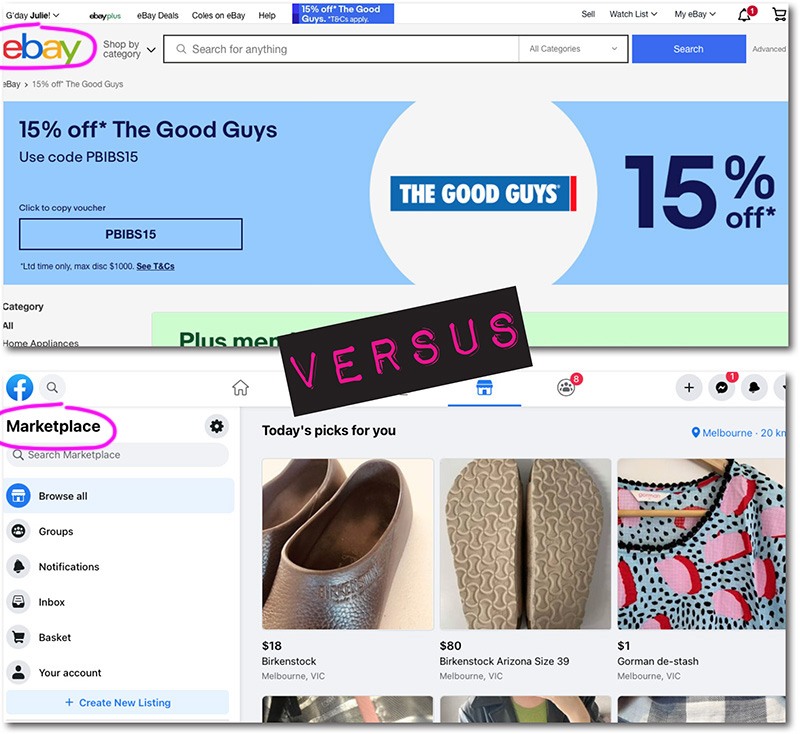
For a broader look at decluttering via selling, take a look at my previous article How To Sell Unwanted Stuff Online.
This time however, I look in more detail at my two favourite powerhouses – eBay versus Marketplace.
eBay
eBay pros for sellers:
- From a tech perspective it’s finely tuned and streamlined.
- It has good SEO (web visibility) so your items have the potential to get under a lot of noses.
- It’s impersonal, meaning you don’t have hagglers and piles of questions. eBay is set up so that your item has transparency, therefore questions and tyre-kickers should be minimised.
- You can choose between different sale formats – Auction and Fixed Price. Auction can leverage buyer demand and increase the price, and Fixed Price is fast and simple.
- Before you list, it’s easy to research what similar items sold for. (Take a look in the filters on the left side of the search screen.) This is important because expected price is a huge factor in whether to list or not. You don’t want to waste time listing a dud, or expecting $100 for something that will get $10.
eBay cons for sellers:
- A bit time-consuming. eBay demands loads of info that you might not have the answer for. List a pair of shoes and you are asked upper material, insole material, outsole material, type, style, European size, US size, UK style – and many many more. These are all separate fields, and eBay gives you a little smack on the wrist if you omit some of their “recommended item specifics”. Ok sir.
- The fees are high and make a dent in your profits.
- Your sales are locked down by PayPal and postage. This also, adds to the cost and preparation time.
eBay tips for sellers:
- Take good photos. Nice lighting and a clean background. Having a dirty floor under your item or clutter behind it shows poor attention to detail and reflects badly on you as a seller.
- Put in as much info as possible. Lean more towards accuracy than sales. Otherwise your seller ratings may suffer.
eBay pros for buyers:
- Transparency. Sellers are incentivised to be honest or risk their seller rating. This is good for buyers.
- Safety. eBay and PayPal together have dispute and chargeback processes that favour the buyer.
- There is a wide selection of items which are highly searchable.
- You can set up Saved Searches which notify you when your keywords come up for sale.
eBay cons for buyers:
- It’s not immediate, especially if it’s an auction. But even if it’s Fixed Price, you generally need to wait for postage.
eBay other:
At the time of writing (March 2021), eBay is transitioning away from PayPal to its own cashless system. Plugging some leaks in its system, to keep everything in-house. I look forward to seeing how it turns out, but no doubt it will be a well-oiled machine like everything else that is eBay.
Marketplace
Markeplace pros for sellers:
- Highly visible for Facebook users.
- Fast and responsive. Listing is easy and you can have someone on your doorstep that day with their wallet open.
- Perfect for big items where shipping is difficult and cost-prohibitive.
- Cash-based. No need to involve Mr Taxman or anyone else. Old-school fun like playing shops in the school yard.
- Free. Unless you choose to use PayPal or set up a Facebook Store there are no fees.
- Unregulated. I’m not advocating sketchy behaviour, but if your info is slightly vague you won’t be hauled over the coals for it. At least not by the platform.
- Fun and local, and you get lots of interaction.
- You generally don’t need to wrap and post items, as the buyer will come to you.
- Facebook Groups are one of the social media’s strengths, and Marketplace leverages that by allowing selling to groups. This is incredibly targeted selling.
Markeplace cons for sellers:
- Lots of haggling, and plenty of time-wasters. Facebook has inbuilt suggested questions, making it easy for a prospective buyer to ask if the item is available with the click of the button. Their actual interest may not match the rapidity of their button-pressing. The reliability of buyers can be hit and miss.
- There are loads of scammers. They will reel you in with convoluted questions and stories, and maybe send you fake payment screen shots.
- It’s a bit lacklustre from a tech perspective. The message icon is often falsely lit up, especially across devices. Also if you have lots of listings it’s difficult to manage them. When items are marked as sold the conversations regarding them are ‘archived’ which makes it hard to find out what was agreed upon. And yet the sold items still come up in your default list, mixing sold and unsold items together. That is until you figure out how to filter by available and in stock. Even more annoyingly, I had ‘Needs Attention’ items at the very top of my list for the longest time. They were very hard to delete (pro tip: they are easier to delete from a phone than a computer).
- Giving out your address can feel a bit dodgy, especially if someone hasn’t made a firm commitment to sell.
- Items don’t re-list or notify you automatically so you won’t know they have become inactive if you don’t log in regularly.
- There is a ban on commerce violations (alcohol, weapons, fake items and many more). This can be mysteriously triggered by innocent listings. It’s a dark hole of Marketplace and if your item falls in, you will never pull it out or find out why. Pro tip: Certain brands will trigger it due to Marketplace trying to stamp out fakes. Yet other brands breeze through. No idea why, but if you are having issues, start again and try leaving out all mention of the brand.
- The algorithm means being tempted by items for sale whenever you log in. Buy one pair of Birkenstocks on Marketplace and you will see new listings for them constantly. Not necessarily evil, but counter-productive from a decluttering perspective.
Markeplace tips for sellers:
- Don’t give out your address unless the buyer is pretty much on their way over, or has paid online. Otherwise it’s kinda unsafe and also, impossible to keep track of who is “hoping to swing by in the next week” to take a look at your washing machine.
- Don’t release your items until you have payment in your bank or in your hand. If money is in your account they can’t get it back.
- Ignore convoluted tales of picking up from afar by courier or relative. It smells of scam. A genuine buyer will make it simple.
- Practice your no stance or factor in some haggle-room.
- The messages and offers are all in different message threads so keep notes or a spreadsheet if there is a lot of communication.
- Don’t Mark as Sold until the transaction is completely finished, because the conversation thread will be archived off and may be hard to find. Mark as Pending instead.
- If you have multiple items, list as ‘in stock’ rather than as a single item, which means the conversation histories won’t be killed off with one sale.
- Don’t rely on dropping the price to shift an inactive listing. The algorithm has probably already decided your listing is unworthy and it won’t be seen. Instead, create a new listing altogether with a lower price. If you want to move items fast, price competitively to begin with.
- I always put ‘No Holds’ in the listings so punters don’t expect it to still be there in a week waiting for them to ‘swing past’.
Markeplace pros for buyers:
- Easy and fast. You can do some weekend garage-sale style shopping from the comfort of your couch.
Markeplace cons for buyers:
- It’s buyer beware. The rating system is rather buried if existent at all, so there are no guarantees you will get what you expect.
- On a similar note, if you set up a contactless transaction by having the seller leave your new item in a safe place, there is no recourse if the item is not there.
Markeplace other
Marketplace is on the rise, and it wants a piece of the serious eCommerce market. It is improving its seller rating system, and allowing sellers to set up stores. This more advanced functionality is not free, but is an evolving service. Its Wild West vibe is like eBay in the heady early days but this rawness may be short-lived.
eBay versus Marketplace – which is better?
Facebook Marketplace is like a love-bomber on Tinder. But eBay is an arranged marriage – slow and steady with an expectation of a reasonable if unromantic result.
I have had mainly good experiences on both, but I lean towards Marketplace for selling and eBay for buying. However there are a couple of over-riding factors. If the item is large, Marketplace is better for everybody. If the item is of high value, eBay’s protections are a necessary insurance for all parties.
eBay versus Marketplace pros and cons aside, what are you waiting for – let’s get selling!






























